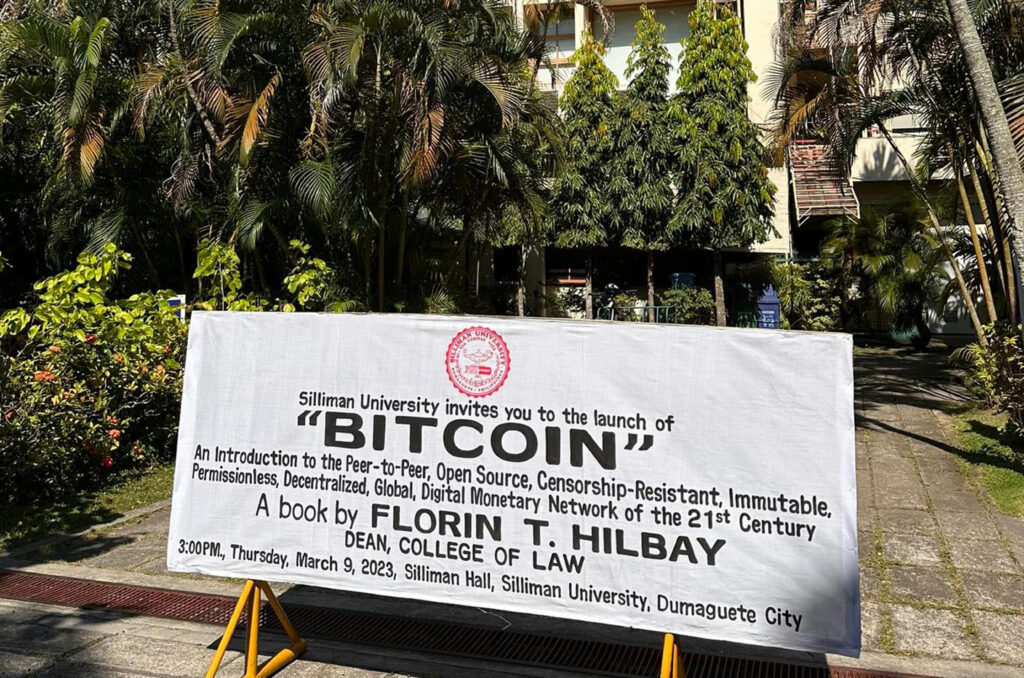Let me start by saying I’m happy to claim full responsibility for the events narrated in this short piece. I do this not to assert pride of ownership but out of a strong conviction that the developments reported here will redound to the benefit of Filipino students, Filipino academics, and the Philippine education system over the short, medium, and long term. A global transformative event is on the horizon, and they will be better off being able to understand what it’s all about and, hopefully, do something about it.
Many in the education sector may not have noticed it, but something interesting has occurred in the Philippine education system in the first three months of this year. First, Silliman University, through its College of Law, has begun to offer a Bitcoin-specific course titled Money & State, a subject that tackles the evolution of money, a process that leads to the study of a new form of technology and an upgrade to the “oldest social network” we call “the money.” This new technology is the Bitcoin Monetary Network. Second, Silliman University is now a producer of knowledge in the Bitcoin universe, after it launched Bitcoin: An Introduction to the Peer-to-peer, Open Source, Censorship-Resistant, Immutable, Permissionless, Decentralized, Global, Digital Monetary Network of the 21st Century.
These two developments mean that Bitcoin education has now entered the formal educational system of Philippines and is now in the process of being assimilated into the curriculum as a regular academic subject. These are significant events for Bitcoin educators all over the world who have been trying to enter universities by offering Bitcoin-related subjects. It is a positive development for Filipinos and Bitcoiners the world over.
1. Bitcoin is perfectly suited for the school system. The university is the place where many of the youth of our nation study and learn. Their fresh minds and the time in their hands make them happily situated for understanding what’s new, challenging, revolutionary, even world-transforming. Our youth are also digital natives and therefore are in a good position to see a digital monetary network such as Bitcoin as the appropriate technology for migrating the world of value to the 21st century’s digital universe. Whereas the last three decades have seen the migration of the world of ideas into the digital realm, the next few will feature an accelerating migration of the world of value into the same digital realm. As a digitally native global monetary system, Bitcoin is superior to the current fiat monetary system in many ways. While Bitcoin is hard to understand, it is eminently understandable, especially for young people because they have fresh eyes and are more open to new ideas.
There is also an aspect of justice inherent in this transition. In many ways, most people today are the victims of the financial engineering that culminated in the 1970s, has ossified ever since, and have left many people with very difficult life prospects going forward. Understanding Bitcoin gives them the tools to know why that is the case and why a solution is now at hand.
2. The academic study of Bitcoin will upgrade and update the foundations of 21st century education. The study of Bitcoin will allow senior faculty to upgrade their understanding of the world; provide the junior faculty with new research subjects to investigate; and equip students with a better grasp of what’s happening with the world. This is bound to trigger new conversations, (hopefully) healthy debates, and produce new understandings. Whether academics agree or disagree with the various theses behind Bitcoin, they will surely find a lot of angles with which to slice the world in front of them. This new platform for academic and practical conversations can only lead to a more vibrant and stimulating intellectual conversations among adherents and opponents alike.
3. Bitcoin and the study of foundations. The university environment is the perfect place for Bitcoin education because it literally forces people to go back to first principles, examine the foundations of the entire political and economic system, and understand the mechanics of how things in the real world operate from a new, powerful lens. The study of Bitcoin is the perfect bridge between the academic, research-oriented aspect of university life and the world of labor, money, markets, and energy where everything has real-world, ground-level consequences. This isn’t to say that universities fail at doing this; it is simply that an entirely new system such as Bitcoin powerfully melds together both abstract and concrete issues in ways that are vastly different from settled academic understandings. A new lens leads to new insights and opens up a new vision of what lies ahead.
4. We are in the midst of a rare transition from one monetary system to another, and there are only two conceivable paths available: one leads to greater authoritarianism and surveillance, while another leads to freedom and individual sovereignty. The short version of the story is this: in the 20th century, the dollar was able to replace gold as money, eventually leading to the transition from the disciplined, sound money humans have known for thousands of years—gold—to what we have today: fiat money or a form of monetary technology that is easy to manipulate to favor those closest to the money printer, accelerating what is known as the Cantillon Effect.
In the 21st century, money will become ever more digital as the world takes advantage of the architecture of the internet not only to exchange ideas but also to exchange or transfer value. As the excesses of the fiat system begin to unravel with unmanageable inflation, bank failures and bailouts, etc. governments will likely transition to central bank digital currencies or CBDCs to maintain their ability to print money and even enhance their regulatory powers. The sane alternative is Bitcoin, a monetary network that is separate from the fiat system, is decentralized, permissionless, and is the embodiment of sound money in the digital age. Its characteristics make it the opposite of fiat money. These developments will re-allocate power, become the source of new forms of understanding, politics, philosophy, even activism. Given the trans-disciplinary nature of Bitcoin, its impact will cross the various academic disciplines and give rise to new questions and answers. The university is a perfect place for these conversations.
Click here to download the PDF version.

